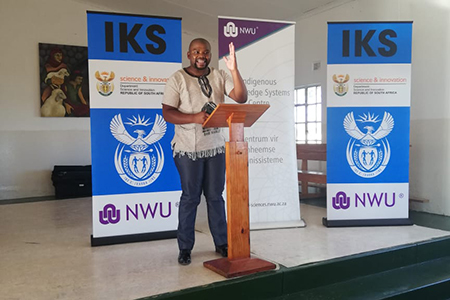In 2020 the North-West University (NWU) joined forces with the Department of Science and Innovation (DSI) to start raising awareness about and to position, develop and promote indigenous knowledge systems – and in particular the Indigenous Knowledge Act (IK Act) and the Bio-cultural Community Protocol (BCP*) – in South Africa.
The awareness campaign kicked off last year in the Northern Cape and Gauteng, and was recently extended to Chaguba in the Port St Johns district and Ngqeleni in the Nyandeni district in the Eastern Cape.
The team spearheading the campaign comprised officials from the DSI’s National Indigenous Knowledge Systems Office (NIKSO) and Legal Service unit, and Lesley Mashego and Otsile Maditsi from the NWU’s Centre for Indigenous Knowledge Systems. The team also included facilitators employed by the DSI in response to the recommendation by Parliament that the campaign must be conducted in the language/s of the various communities.
In Chaguba a rigorous and positive engagement was held with the amaMpondo tribe of the Eastern Cape. The audience included community development workers, traditional leaders and healers, as well as members of the community.
During these sessions the team explained the purpose of the IK Act and the BCP.
The Indigenous Knowledge Act focuses on the protection, promotion, management and development of indigenous knowledge in the country, and the BCP was developed by the DSI as a tool to enforce the act.
A BCP is a document that is developed after a community undertakes a consultative process to outline their core cultural and spiritual values and customary laws relating to their traditional knowledge and resources.
“The BCP is meant to provide clarity to community members about their rights and responsibilities, and outlines appropriate behaviour of both the community and those interacting with them,” explains Lesley.
“Adherence to these community protocols help to ensure social cohesion and reinforces customary laws, values, and decision-making processes.”
During the sessions the NWU representatives also shared information about its Bachelor’s degree in Indigenous Knowledge Systems (BIKS).
“The NWU is the first tertiary institution to offer a BIKS degree as a strategic intervention in the development of human capital in indigenous knowledge systems,” says Otsile.
“We want to encourage young people to actively participate in the promotion and preservation of indigenous knowledge, and to consider the BIKS degree as a possible profession over and above the orthodox careers.”

Otsile Maditsi from NWU is addressing community members during the indigenous knowledge awareness campaign in the Eastern Cape.
